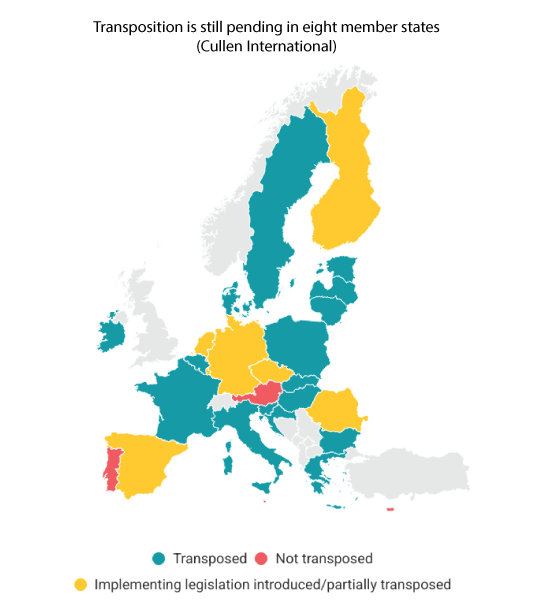Eight member states are still transposing the Corporate Sustainability Reporting Directive (CSRD), having missed the 6 July 2024 transposition deadline. No additional EU member states have transposed the CSRD since May 2025. The Commission has issued formal infringement notice letters to 17 member states for their failure to transpose the CSRD fully.
The CSRD requires all large companies to publish regular reports on their environmental and social impact activities. The directive defines a common reporting framework for non-financial data, which aims to ensure that businesses report reliable and comparable sustainability information.

The Commission decided to postpone the application of the CSRD by one year for large enterprises, parents of large enterprises and SMEs with securities listed in the EU. The CSRD amendment was implemented through the Omnibus I ("stop-the-clock") directive, which member states must transpose into their national legislation by 31 December 2025.
Only France has so far transposed the "stop-the-clock" directive and only three other member states have taken formal steps to do so.
Cullen International’s updated benchmark tracks the progress made by the 27 EU member states in transposing the CSRD and the related “stop-the-clock” directive.
For more information on the benchmark and Cullen's complete CSRD coverage, please click on “Access the full content” - or on “Request Access”, in case you are not subscribed to our Sustainability service.
more news
27 January 26
Global trends in digital policies and regulations to watch in 2026
The geopolitical climate of 2026 will likely influence public policies for infrastructure for digital connectivity, data-based services and the online platform economy in all parts of the world. Our global trend report aims to briefly comment on these trends.
26 January 26
The DNA explained: addressing fragmented national approaches to spectrum
Cullen International is issuing a series of analyses on different aspects of the Digital Networks Act (DNA) proposal. This report covers radio spectrum.
23 January 26
Analysis of how UK Cyber Security and Resilience Bill compares to EU NIS2
Our new report analyzes how the UK Cyber Security and Resilience Bill compares to the EU NIS2 DIrective. The UK bill proposes amendments to the existing UK NIS Regulations that would align the UK cybersecurity regime closer with the EU framework established under the NIS2.